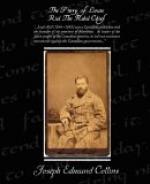“I see. He has gone there, counting on safety beyond the lines; but he leans upon a hollow reed. Let me see: to-morrow at the convention, next day at the grand parade of arms. Yes, on Tuesday evening, take with you forty men to Pembina. Of course, you go there with all speed, and locate the residence. Then on Tuesday night, when you enter the city, surround the house by a sortie You will have nothing to fear from the citizens, they have no force there to oppose yours, and if they had you could accomplish your mission so suddenly that you might be on the prairie with your prize before they had their arms in their hands.” The horseman rode off, and the Rebel was alone.
We have seen that Mr. McDougall had appointed his Deputy Colonel Dennis, as Conservator of the peace, and authorized him to organize a force, and put down the Rebellion. The English and Scotch settlers, almost to a man, sympathized with the interdicted governor; yet they did not care to bring themselves into conflict with men, with whom, for years past, they had lived in the most friendly relationship, unless some great necessity arose. As for Riel, they regarded him as an ambitious, short-sighted demagogue, who palmed off his low cunning for brilliant leadership, upon the credulous half-breeds. Nevertheless, a large number of these settlers declared their readiness to march under Colonel Dennis, and disperse the nest of rebels at Fort Garry. I need hardly say that most of the Irish settlers were heart and soul with Riel. It was not that they had any particular grievance to resent, or any grievance at all for that matter. It was as natural to them to rise in revolt, since the rising meant resistance to the lawful authority, as it is for the little duck first cast into the pond, to swim. A red haired, pug-nosed Irishman, coming to New York, leaped ashore and asked,
“Is there a guvernment in this counthry?”
“There is.”
“Thin I’m opposed to it.”
Much the same was it in the North-West, and the violent, blustering ruffian O’Donoghue was the mouthpiece, the leader, the type of that class of the people.
A number of loyal Scotch and English, therefore, did arise, and they were known as the Portage party. This was some months after the night that we last saw Riel thwarted upon the prairies. In that connection it only remains to be said that the mission of the confidant to Pembina was fruitless; and the Rebel gnashed his teeth that his desires and his revenge had all been baulked. He had heard, however, that Thomas Scott was abroad through his territories; and that he had enlisted under the banner of Colonel Dennis,—which was the truth. What galled him most was, that in case he should succeed in getting Scott into his hands, he had no proofs that would be regarded as sufficient evidence upon which to proceed with the extreme of vengeance toward him. Yet his orders stood unchanged:
“Wherever you find Thomas Scott seize him; and convey him to Fort Garry.” On the sixth of December the confidant came into the tyrant’s presence and said:




